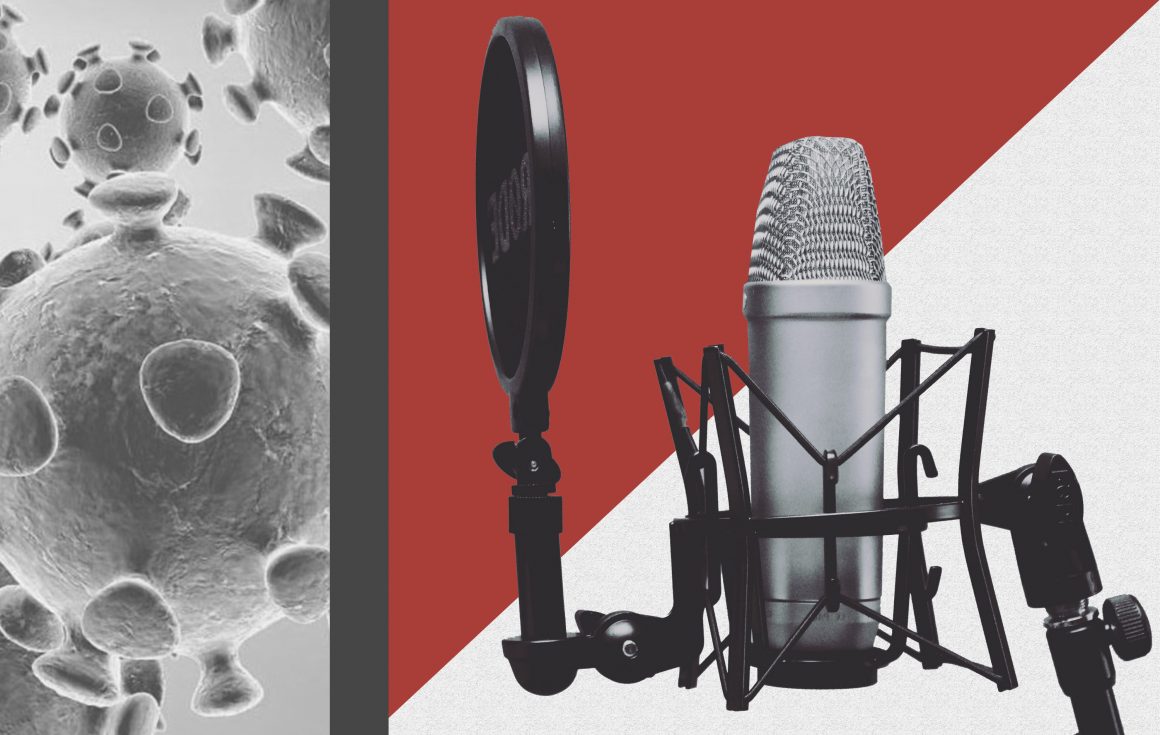
UCalgary releases COVIDcast podcast — and it’s pretty good
By Nikayla Goddard, April 11 2020 —
At the time of publication, there were six episodes released of a podcast called UCalgary COVIDcast, which can be found on its own website as well as on Spotify.
COVIDcast is self-described as a podcast that provides “up-to-the-minute information from leading experts on the medicine, science and community considerations that surround the coronavirus pandemic.” Hosted by Nuvyn Peters and Corey Hogan, episodes are released every one to three days, focusing on different topics and involving interviews with different leading experts in various fields related to COVID-19 studies.
Listening to the first episode, Public Health Always Wins, hostess Nuvyn Peters sits down with University of Calgary Vice-President research and public health expert Dr. Bill Ghali, who is also a professor for the Departments of Community Health Sciences and General Internal Medicine, Scientific Director for the O’Brien Institute for Public Health and co-director of the University of Calgary World Health Organization (WHO) Collaborating Centre in Disease Classifications and Health Information. Overall, the episode seems slightly dramatized, but nothing beyond conventional usage of music and selected quotations, and effectively uses the podcast platform to convey informative news and interviews.
Nuvyn and Dr. Ghali first discussed how COVID-19 has impacted research. “In terms of current history, this is a massive global event that affects so many aspects of life,” Dr. Ghali said. “And research is really challenged, because we are being told we need to practice social distancing, which affects our ability to go to a workplace and use equipment and interact with people and with research.”
This is especially true when considering how many research projects involve seeing people face to face, physical contact and testing and monitoring like clinical drug or treatment trials. In this manner with the implementation of social distancing, universities effectively have to scale back research, which simply can’t be done with more critical research that is time sensitive or involve trials that may cause risk to those in the trial to stop. Dr. Ghali says that looking into “telemedicine platforms” and using technological communication with trials and research is what is happening right now. He added that UCalgary has made a clear mandate that research activities should be adjusted, delayed or scaled back, but not shut down entirely.
Peters asked Dr. Ghali whether the pandemic would put pressure on treatment for other diseases, to which he responded that elective surgeries — such as knee and hip surgeries or sex reassignment surgeries — are being delayed to the frustration of many.
“I think that kind of delay is understandable,” he said, “where it’s not critical because we are going to have a stretched health care workforce.” He added that this type of strain and delay of elective surgeries will likely last for two to three months, if not longer.
When asked about how Alberta’s health care system has affected the province’s response to the crisis, Dr. Ghali replied, “I do believe that having an integrated provincial health authority is a very good thing — for decision making, for standards, for workforce planning. In the context of COVID, for infection control measures, having a medical officer of health with very well-measured messaging, Dr. Deena Hinshaw, is very good for the province and for Albertans, and I hope the public feels that because I think that’s a really positive thing.”
He also explained that because of the university’s nature in leading research and being involved, our nursing and medical faculties operate as health care workers in the system. Dr. Ghali also touched on the pros and cons of Canada’s current health system organization in its ability to respond to the pandemic and pass along information.
Peters mentioned that many are saying that COVID-19 is going to be around for a long time, to the point where it becomes our reality, the norm.
“That may be the case,” Dr. Ghali responded. “What happens with epidemic curves is that the reason the curves start to slow down is that as an increasing number of people are infected, the ability of the virus to propagate is decreased because the virus spreads when nobody has immunity.” The infection rate will decrease then, but will still be a drawn out process of occasional cases for a while, especially if the virus mutates. Though, he noted, the virus may mutate to be “hopefully less deadly.”
Dr. Ghali passed on some final advice for listeners to close the episode — “Human beings and societies are resilient, that’s one thing to say. Public health always wins. This will pass.”
Further episode topics for COVIDcast include the importance of exercise for physical and mental wellbeing, how to be motivated and productive during isolation, research being done to improve diagnosis and treatment in children, how the virus infects and spreads and supports and services in place for UCalgary students.
Propose topics for future episodes by emailing podcasts@ucalgary.ca.
